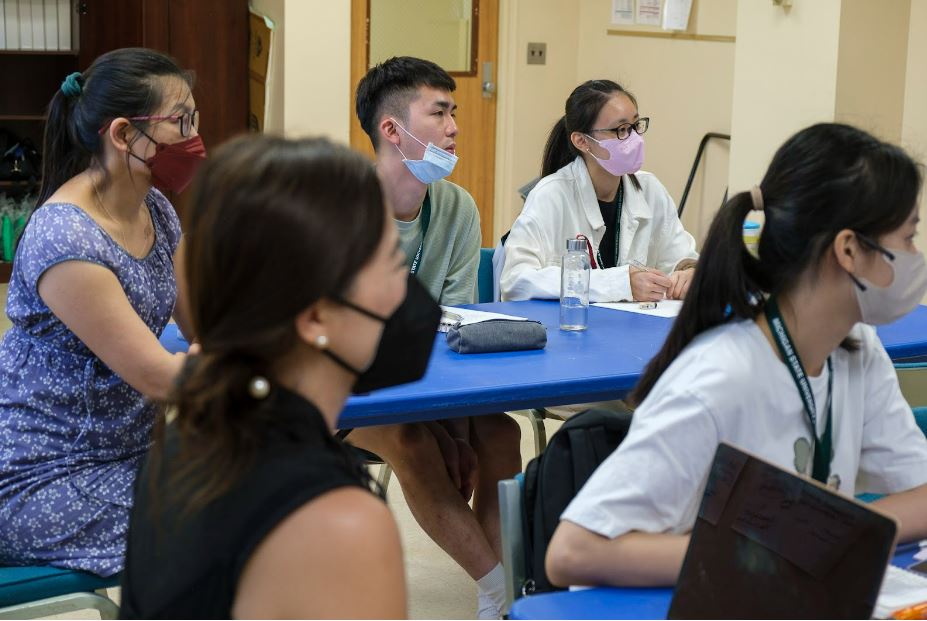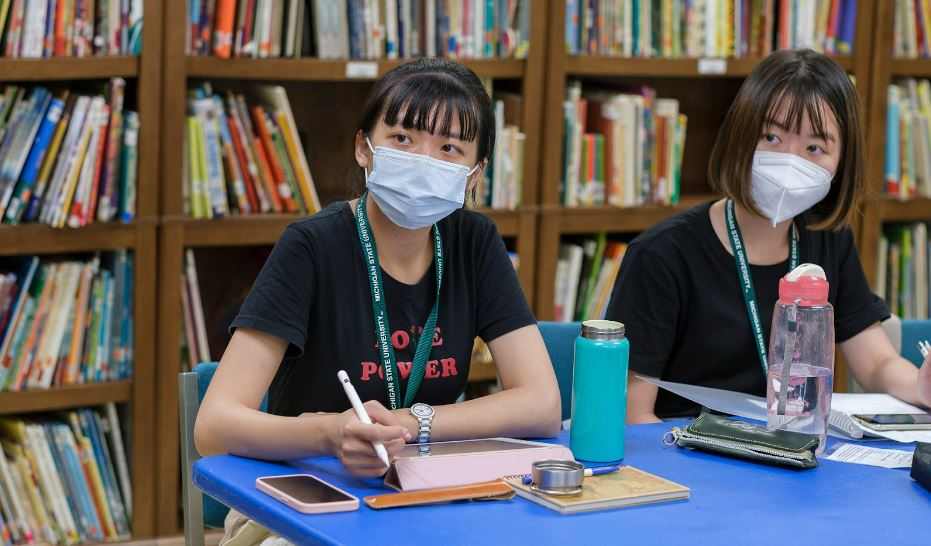MSU Child Development Laboratories welcome Taiwanese students for summer international program
August 7, 2022 - Katie Nicpon
Caption: Yu-Hsin Tsai takes notes during the afternoon workshop at the MSU Child Development Laboratories. Photo credit: Jacqueline Hawthorne, MSU.
“I hope I can be a preschool teacher one day,” Hsin-Chieh Chung smiles through her mask. She is studying childcare at Chang Gung University of Science and Technology in Taiwan, a partner school for Michigan State University’s Child Development Laboratories. Chung is one of 11 students from Taiwan participating in the CDL’s summer international program, a program that welcomes students to visit East Lansing and learn about different methods of childcare and teaching first-hand.
During the morning, the students spend time in different age-group classrooms, interacting with children and learning from the head teachers in the room. In the afternoons, they attend workshops to learn more about the science behind child development and how it's incorporated into the classrooms.

“It is very special for me to travel to America to learn how to take care of children,” Yu-Hsin Tsai said. She is an infant and childcare major from National Taipei University of Nursing and Health Sciences.
Wan-Hsuan Lin, international coordinator for the CDL translates for each of the students. They both remark on their interest in watching children have and navigate choices.
“Yu-Hsin was surprised by how children have the freedom to choose what they want to do,” Lin said on her behalf. “And how the teacher respects their decision and provides choices for them. So it is children-centered compared to Taiwan’s more teacher-centered. For example, snack time is actually a free choice time, which means the children can decide if they are hungry or not hungry.”
She gives another example of how the students were surprised at how loud the classrooms are with kids encouraged to express their emotions and solve problems on their own.
“In Taiwan, the teachers ask children to stay quiet, and here, children have the freedom to express their happiness, their excitement, their emotion – they can express whatever they feel,” Lin said, translating for both of the students.
Students arrive at 7:30 a.m. in the morning and Lin meets with them for 30 minutes and talks about what their assignments are and what they can look for in the classrooms that day. She also answers any questions they have before they meet with their head teachers or associate teachers to talk about where they’re going to be for the day and what they can anticipate.
“We have a pre-meeting and a meeting after, and that’s how we exchange ideas,” Lin said. “This helps me understand their learning process and their thoughts. Also, if they don’t feel comfortable to share with their head teachers yet because of the language barrier, they can speak with me. I’m like a bridge between the students and our school.”
The international program began 13 years ago and was Lin’s brainchild. She started at the CDL as a teacher and was chatting with Laurie Linscott, CDL director, about a group of Japanese students who had visited the CDL for two weeks in the past.
“I am from Taiwan, and I was thinking that if I can have my people come to visit the Child Development Laboratories, they would have a wonderful experience,” Lin said. “So I talked to Laurie and we worked on a program design and a business plan.”
In the beginning, they started with a two-week model, but quickly learned from participant feedback that the international students would benefit from more time. They expanded the program to a four-week program where students would have a chance to spend time with four different age groups.
“This experience is wonderful,” Hui-ying Hung, a professor from Chang Gung University of Science and Technology. “Our alumni who finished this program have had a very good experience. Many of them apply for graduate study in Taiwan and some of them go to different countries to do their careers. This program really brings a lot to our students and my department appreciates this program.”
CDL international student alumni have their own Facebook group where they are able to connect and share about their experiences and network with each other. Over five years ago, Linscott visited Taiwan to meet up with their alumni and was overwhelmed by the number of former participants eager to spend time with her and each other.
Another aspect of the program is that students have an immersive cultural experience.
“For example, they’ll be able to visit Lake Michigan and an outlet mall,” Linscott said.
“And there’s no ice arena in Taiwan, so they are so excited to try ice skating,” Lin said. “They also have a tour of the capitol, and in the summer, they can go kayaking.”
Lin and Linscott have asked for participant feedback from each year and are continually evolving the program and learning about the cultural activities that students enjoy the most.
“This year, we’re piloting having the students stay in one classroom for the entire four weeks,” Linscott said. “We want to see if it helps build relationships between the head teachers and the international students, and also, the international students get to know the children better and vice versa.”
The international program was on pause during the pandemic, and this is the first summer they’re offering it again.
They typically welcome 15-20 students each summer, but in the future, Lin and Linscott hope to grow the program to welcome 25-30 international students next year.
“We would like to grow our program to be able to host six to eight different groups, because that’s what our system could sustain,” Linscott said.
Lin and Linscott hope to reconnect with the groups who were not able to travel the last several years because of the pandemic, and they have been speaking with new interested groups too.
“It's because of Wan-Husan, her passion for this program, and relationships that she's built with the different universities that makes this so successful,” Linscott said.
To learn more about the MSU Child Development Laboratories, visit https://hdfs.msu.edu/cdl.


